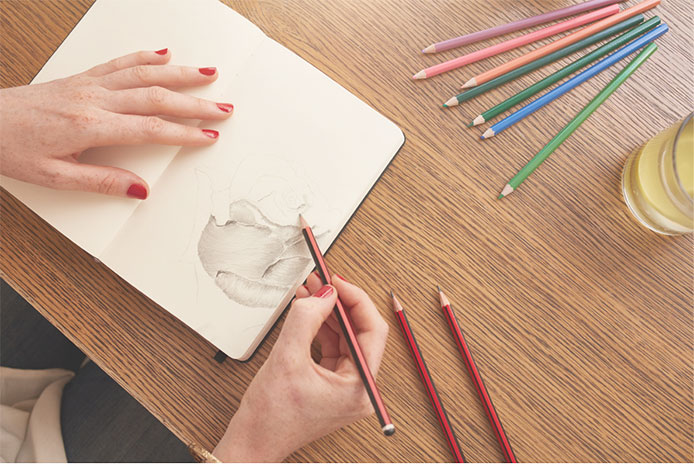Discover our tailored approach to mental health support, designed to empower individuals on their journey towards emotional well-being and personal growth.
At Avise Wellness Collective, we acknowledge how difficult the journey of recovery is without care that addresses the unique needs of each individual who crosses our threshold. This is why we take a holistic approach to treatment, working to address the health of the whole person, not just the symptoms of substance use disorder. Our goal is to provide a safe and peaceful environment where we can empower those in recovery so that they can develop the tools necessary to start their new lives free from substance use.
One of the most important components of this treatment environment is our array of mental health services.

Just as no two people are exactly the same, there is no one size fits all approach to recovery or the treatment of substance use disorder. That’s why our approach to addiction treatment is personalized and holistic. Before developing a treatment plan for a new client, we assess the needs of the whole person and tailor a program to meet those needs. By acknowledging the individual, we strive to make you feel empowered in your life without substances instead of feeling bound by the chains of your past.
We combine evidence-based therapies and trauma-informed responses to address all factors in your life leading up to your arrival here at Avise Wellness Collective. These therapies incorporate many holistic methodologies, as we acknowledge that you are more than just your mental health and substance use disorder symptoms. As a component of holistic, personalized treatment, we understand that mental health disorders commonly accompany SUD and that to treat the SUD we must simultaneously treat the underlying mental health condition.
Having a dual diagnosis, or co-occurring disorders, describes an instance when someone has both a diagnosed mental health disorder and a substance use disorder. Often, someone with a dual diagnosis can use substances in an attempt to numb or eliminate the symptoms of the mental health condition; at the same time, the effects of substance use can serve to worsen those symptoms or even trigger new ones. This can lead to a vicious cycle that is nearly impossible to escape without professional support.
Mental health disorders that commonly appear alongside SUD include:
Upwards of 25% of individuals with one of the above mental health disorders (or any other) also have an SUD. Likewise, nearly 40% of individuals with a substance use disorder also report a mental health disorder.
These substances are often used in conjunction with a dual diagnosis:
These are in no way exhaustive lists of the mental health disorders and substances that affect the individuals we treat, and many people experience multiple mental health conditions and multiple combinations of substances in an attempt to address them. That’s why it is so crucial to identify and treat both the SUD and the underlying mental health issue(s) to achieve a successful recovery. If only the SUD is treated, you won’t receive the care you need to manage your mental health symptoms, and you cannot build the healthy coping mechanisms you need to maintain recovery.
A true person-first, holistic treatment program employs multiple therapeutic modalities to address mental health alongside SUD. When you arrive at Avise Wellness Collective, we will assess your needs first, then create a personalized treatment program that may include the following strategies:

Cognitive behavioral therapy, or CBT, is a common therapeutic method used to treat SU, as well as other behavior-related mental health concerns. The main goal of CBT is to link the actions a person takes to their feelings. This can help them identify thoughts and situational triggers for their SUD and that their SUD is inextricably linked to their feelings.
Frequently, past traumas and environmental factors linked to these thoughts can prompt the choice to use substances. CBT works by teaching a patient that what they are feeling stems from irrational or negative thoughts and that the linked actions are not rational decisions. The aim is to pinpoint the negative thoughts in order to develop the understanding that these are impulse-based and may lead to a desire to take a negative action – in this case, using substances in an effort to numb the negative feelings.
If this has been your experience with SUD, learning these things with the help of CBT can help you build the tools you need to understand addiction and be more successful in recovery. With a safe space and the opportunity to look at negative experiences from your past with a new understanding, you can learn new behaviors to address them. These healthy behaviors, or coping mechanisms, can be substituted for substance use. CBT is effective at addressing SUD and co-occurring disorders like ADD/ADHD, anxiety, OCD, bipolar disorder, and PTSD.
For those with a penchant for feeling incredibly intense emotions, dialectical behavior therapy, or DBT, may be effective. DBT is a specialized type of talk therapy that has been adapted from CBT and specifically developed to help deal with intense emotions.
CBT teaches people that there is a link between their thoughts and their actions and that they must redirect their thoughts to halt the cycle of SUD. DBT is similar but teaches people to accept those thoughts in a safe environment where they can manage the emotions the thoughts provoke. People can learn to accept their past while changing the behaviors linked to their past experiences.
DBT is considered effective for people with borderline personality disorder, PTSD, depression, and more who have begun using substances to cope with intense emotions.
Mindfulness and meditation can be excellent practices for those in recovery from SUD. This range of techniques teaches people to live in the now, accept their past mistakes, and let them go rather than dwelling on the past. Mindfulness and meditation can help people slow down, experience the world around them, and take the time to exist in the moment that they’re currently living.
Mindfulness is key to helping people with SUD relearn how to experience the world and focus on everyday life again. Rather than trying to numb the emotions and stresses caused by life, those practicing mindfulness and meditation can experience sensory events in a controlled and safe environment. This focus can help people employ coping strategies as they experience a stressful event, including breathing techniques, connection with the world, and more.

Like CBT and DBT, mindfulness and meditation can help you understand your triggers and reactions to stress. Then, you can employ proven techniques to stay grounded in the moment, reconcile your emotions with the event, and employ strategies to cope.

Expressive and creative therapies allow an individual to explore their feelings in an environment that is safe and controlled. Because SUD is frequently linked to trauma, being able to revert to creative play and art gives patients a chance to express their emotions freely and without judgment. Art and other creative or expressive therapies are used in conjunction with other kinds of therapy, like talk therapy, CBT, DBT, and more, to get to the root of the issues that a person may be facing.
A popular art therapy activity involves drawing the things that caused you to seek treatment and reflecting on any feelings that come up as you’re drawing.
Throughout the course of an SUD, it is common for people to lose control of their lives to the point that they may have a difficult time maintaining essential life skills. For example, you may have lost the desire to take part in hobbies or relationships or forgotten about the different ways you need to take care of yourself. Fortunately, these skills are something you can learn again at Avise Wellness Collective. Some of the things we teach:
Because SUD is deeply linked to feelings and reactions to those feelings, people in recovery have to learn to deal with their emotions again. This can be difficult if they’ve spent a great deal of time ignoring those feelings. We teach emotional regulation techniques as well as coping strategies for stressful events and other triggers.
Another thing that can get lost during active SUD is the ability to communicate and relate to other people. Spending so much time pushing down feelings and avoiding others can make it difficult to manage relationships and effectively communicate with others. These are skills that are essential for reintegration into the world and rebuilding healthy relationships.
SUD often develops as an individual struggles to manage stress or difficult feelings and addresses them with a substance. When that is a frequent reaction, it can be incredibly difficult to manage stress in other ways. We teach new ways to manage stress, from developing new hobbies like exercise or art to therapeutic exercises for stress reduction.
Unfortunately, SUD can cause a loss of a sense of self and totally deplete self-esteem. People with SUD and co-occurring mental health disorders may feel like nothing will ever change, and nothing can get better. We strive to teach clients about self-esteem and the importance of letting go of the past to effectively manage the future.
Mental health and SUD often go hand-in-hand and must be treated concurrently for a successful recovery. At Avise Wellness Collective, we understand the importance of treating the underlying conditions behind SUD rather than just the symptoms. To help, we offer the support and services necessary for you to build the tools you need to achieve lasting recovery.
We take a holistic approach to mental health and addiction treatment, combining traditional therapeutic methods with other approaches to provide treatment for the whole person and not just SUD. With a positive environment and a safe space to learn how to cope with both mental health and SUD, you can find success in recovery.
There’s no reason to suffer in silence with SUD, especially if you are experiencing issues with your mental health. If you or a loved one are in need of evidence-based, holistic, dual diagnosis mental health and SUD treatment, Avise Wellness Collective offers mental health support and services in Pennsylvania. Contact Avise Wellness Collective to begin your path to recovery.
Admissions, the provisions of services, and referrals of clients shall be made without regard to race, color, religious creed, disability, ancestry, national origin (including Limited English Proficiency), age, or sex.
Program services shall be made accessible to eligible persons with disabilities through the most practical and economically feasible methods available. These methods include, but are not limited to, equipment redesign, the provision of aides and the use of alternative service delivery locations. Structural modifications shall be considered only as a last resort among available methods.